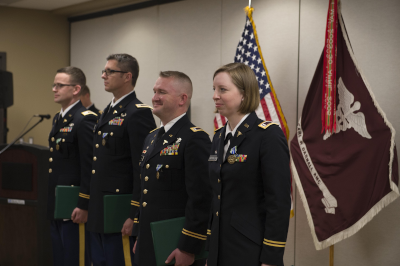Story by Andrew R. Smith, Texas Military Department Public Affairs
Fort Hood, Texas – On January 31, 2020, Class 17-3 graduated the Army’s Interservice Physician Assistant program at the Carl R. Darnall Army Medical Center, welcoming four new physician assistants into the Army.
 January 31, 2020 Soldiers from Interservice Physician Assistant Program class I7-3 graduate during a ceremony held at the Caral R. Darnall Medical Center. (U.S. Army National Guard photo by Andrew R. Smith/Released)
January 31, 2020 Soldiers from Interservice Physician Assistant Program class I7-3 graduate during a ceremony held at the Caral R. Darnall Medical Center. (U.S. Army National Guard photo by Andrew R. Smith/Released)
The graduating Soldiers were recognized for completing their postgraduate studies and earning the title of physician assistant (PA). Three of the four Soldiers also earned their commission as Army officers upon completing the course. Among the attendees were unit members and family members of the graduates, as well as medical professionals who had worked alongside the students to provide training and education.
For one of the graduates this event was the culmination of years of work and the fulfillment of a long-term life goal.
“I always wanted a medical career. I was commissioned as an engineer but I had a great relationship with the battalion PA in my last unit,” said Capt. Adam Todd. “She helped the unit immensely by evaluating running related injuries and physical routines. She made a suggestion to the battalion command that the intensity of runs be reduced and injuries in the unit decreased sharply. That ability to have influence on the battalion commander and the ability to help Soldiers really inspired me.”
To become a physician assistant, students must pass classes in anatomy, physiology, pathology, diagnosis, treatment, disease processes, communication and patient assessment. This rigorous coursework includes weekly tests and many hours of research and writing outside of class. Fortunately, the students were in the hands of very capable instructors— some of who had taken the same path and gone through the same course of study.
Guest Speaker Teresa Walters, an Army veteran of 20 years, as well as a graduate of the Army’s Interservice Physician Assistant program provided the graduates a few words of wisdom and insight.
“I always tried to interject life lessons into what I was teaching, the method I use is humor. It really opens the students up and I feel like it gets them to trust you more,” she said. “I also tried to make myself as available as possible for any questions they had, be it classes or life in general. I let them know the importance of being approachable as a PA.”
When asked about how it felt to be remembered fondly by the students and asked to return and speak at their graduation Walters said, “I was honored when they asked me to come back and speak at their graduation. I taught them almost two and a half years ago and it validated the work I did and what I taught them, and to me showed that I made a difference. It meant a lot that they remembered all of that, and I can’t wait to see what they do.”
With assignments in hand, the students will report to field units where they can begin to put their training and education to use by serving and safeguarding Soldiers.
The Army officially began its physician assistant program in 1971 at the Medical Field Services School in Fort Sam Houston, in San Antonio, Texas. The roots of the program date back to World War II, when a fast-track training for medical doctors was implemented to assist in the war effort. In today’s Army, a physician assistant performs most of the duties of a healthcare provider on a battalion level, providing localized and immediate care to soldiers wherever they may be.